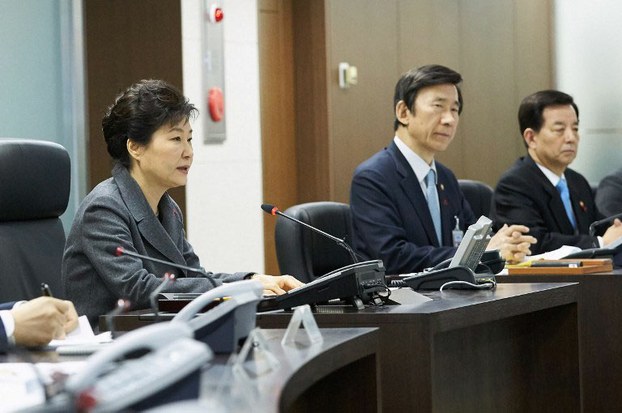South Korea to restart border broadcasts to North after nuclear test
| Publisher | Radio Free Asia |
| Publication Date | 7 January 2016 |
| Cite as | Radio Free Asia, South Korea to restart border broadcasts to North after nuclear test, 7 January 2016, available at: https://www.refworld.org/docid/56c31edee.html [accessed 1 June 2023] |
| Disclaimer | This is not a UNHCR publication. UNHCR is not responsible for, nor does it necessarily endorse, its content. Any views expressed are solely those of the author or publisher and do not necessarily reflect those of UNHCR, the United Nations or its Member States. |
2016-01-07
 South Korean President Park Geun-Hye (L) speaking as Foreign MInister Yun Byung-Se (2nd R) and Defence Minister Han Minkoo (R) listen during an emergency meeting of the National Security Council at the presidential Blue House in Seoul, Jan. 6, 2016. AFP
South Korean President Park Geun-Hye (L) speaking as Foreign MInister Yun Byung-Se (2nd R) and Defence Minister Han Minkoo (R) listen during an emergency meeting of the National Security Council at the presidential Blue House in Seoul, Jan. 6, 2016. AFP
Seoul said on Thursday that its initial response to the previous day's nuclear test by rival North Korea would include turning back on cross-border broadcasts of loud South Korean pop music, global news and information about the wealthier, democratic South, the foreign ministry said.
The broadcasts from power loudspeakers, which also include propaganda condemning North Korean leader Kim Jong Un and his regime, would "completely resume" at mid-day on Friday, Kim's birthday, said Cho Tae-yong, the deputy chief of national security at the presidential Blue House in Seoul.
"Our troops will remain in a state of full readiness and be fully prepared for a firm response in the event of any provocation from the North," he added.
Defense Minister Han Minkoo told a parliamentary hearing that "reopening broadcasts is not our only option among military responses to the North's nuclear test. There are also military responses and economic responses."
Seoul also decided to limit the South Koreans who travel to a special industrial park run by the South in Kaesong, North Korea to "essential staff," officials said.
According to South Korean media, the broadcasts include K-pop – rap and dance music by the country's well-known boy and girl bands – and talk about sensitive topics like human rights and lifestyles. They are blasted from 11 locations along the heavily fortified border and for several hours at a time a repeated throughout the day and reach well into the southern flank of North Korea where much of its huge army is stationed.
The two Koreas nearly came to blows last August over the border broadcasts in a crisis that was defused by 30 hours of senior-level talks at the Korean War truce village at Panmunjom.
That crisis escalated after Pyongyang had declared a "semi-state of war" and fired shots in the direction of the speakers and had threatened to hit them with artillery if Seoul did not halt the broadcasts.
The August talks produced statements in which Pyongyang said it would end its threat to fire artillery at South Korea and expressed "regret" for August 4 mine explosions that maimed two South Korean soldiers. The North expressed "regret" without acknowledging its role in the landmine incident.
Reported by Sung-Woo Park for RFA's Korean Service. Translated and written in English by Paul Eckert.
Link to original story on RFA website
